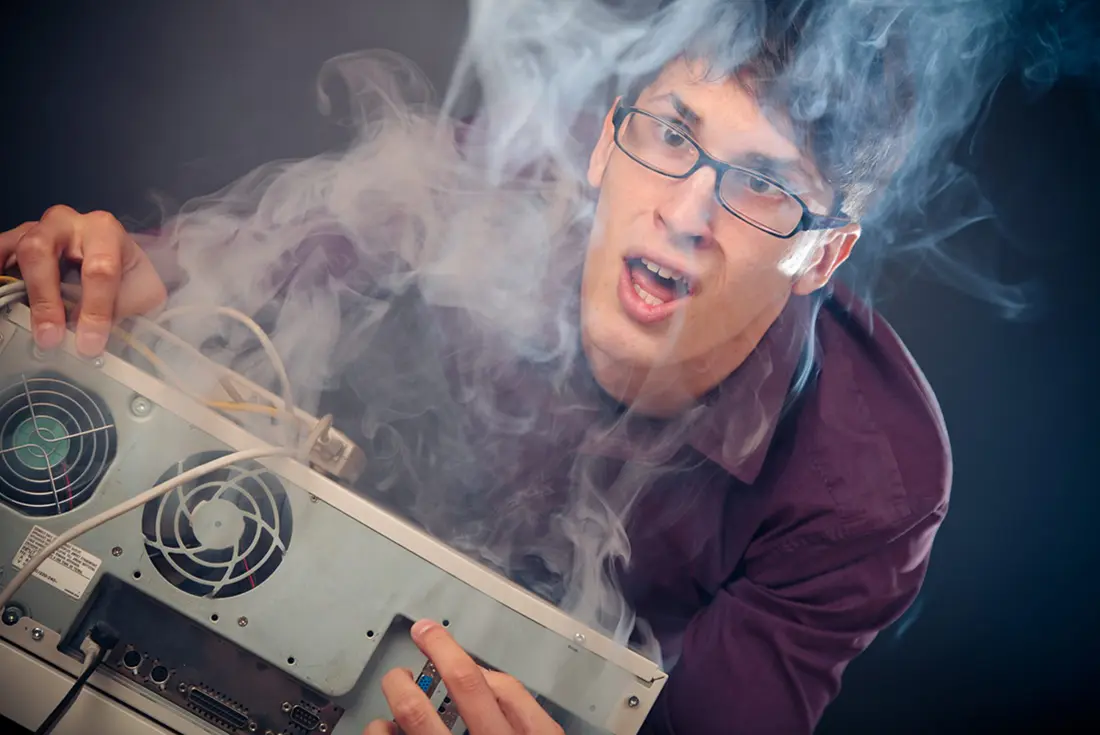
12 Aug The Silent Killer: Recognizing and Preventing Computer Overheating
Picture this: you’re in the middle of an intense gaming session, editing a crucial video project, or crunching numbers for an important presentation when suddenly, your computer shuts down without warning. Your heart sinks as you realize the potential loss of hours of work and the frustration of a disrupted workflow. This scenario is all too common, and the culprit behind this sudden shutdown is often the silent killer: computer overheating.
Overheating can wreak havoc on your computer, leading to decreased performance, system instability, shortened lifespan of components, permanent damage, and costly computer repair and maintenance. Recognizing the signs of overheating and taking proactive measures to prevent it is crucial for maintaining a healthy and efficient computing experience.
Signs of an Overheating Computer
Your computer or laptop will often give you subtle hints that it’s struggling with heat management.
- You may notice a loud fan noise as your computer’s internal temperature rises, causing the fans to spin faster to dissipate heat.
- Unexpected shutdowns or restarts could be a protective mechanism to prevent damage from overheating.
- Overheating can cause your CPU and GPU to throttle their performance to avoid damage, resulting in sluggish performance, lag, and decreased responsiveness.
- Your computer might display error messages or warnings related to high temperatures or fan failures.
- The case, keyboard, or other parts of your computer might feel unusually hot to the touch.
- In extreme cases, overheating can cause components to melt or burn, emitting a distinct burning smell.
For building, upgrading, and computer repair Downtown Computer Services is the best place in Fort Lauderdale. We’ve been fixing computers since 1995, and we’re experts at everything from hardware repairs to virus removal and data recovery. Don’t let tech issues slow you down – contact us today at (954) 524 9002 and let’s get your computer back in top shape.
.
Confirming Overheating: Monitoring Component Temperatures
Observing these signs is a good starting point, but to be certain and pinpoint the overheating culprit, you need to monitor component temperatures. Several software applications provide real-time readings of your CPU, GPU, and other critical components. Popular choices include HWMonitor and Open Hardware Monitor. For Mac users, there’s nothing better than iStat Menus. These tools allow you to track temperature trends and compare readings against the manufacturer’s recommended operating temperatures to identify any components exceeding safe limits.
Causes of Computer Overheating
Several factors can contribute to computer overheating. Understanding these causes empowers you to take preventative measures and avoid repairing computer. Dust and debris buildup in fans and vents act as an insulator, trapping heat and preventing proper airflow, leading to overheating.
Similarly, inadequate ventilation, such as placing your computer in a cramped space or blocking its vents, can restrict airflow and exacerbate heat buildup. If your computer’s fans are not spinning properly or the heatsinks are not making proper contact with the components, heat dissipation will be compromised, leading to elevated temperatures.
Overclocking, which involves pushing your CPU or GPU beyond their factory settings, can lead to increased heat generation and potential instability. Running demanding applications or tasks like video editing or gaming can put a heavy load on your system, generating more heat than usual. Finally, high ambient temperatures in your environment can make it more difficult for your computer to dissipate heat effectively, contributing to overheating.
Preventing Computer Overheating
To keep your computer running cool and avoid the detrimental effects of overheating, several practical steps can be taken. Regular cleaning of your computer’s fans and vents using compressed air is essential to remove dust and debris buildup that can obstruct airflow. Ensuring adequate airflow around your computer is equally important; make sure there’s enough space around it for proper ventilation and avoid placing it in enclosed spaces or blocking its vents.
Regularly check for any malfunctioning fans or heatsinks; if you notice that your computer’s fans are not spinning properly or making unusual noises, they may need to be replaced. Unless you have the necessary expertise, it’s best to avoid overclocking your CPU or GPU, as this can lead to increased heat generation and potential instability.
Closing unnecessary applications running in the background can also help reduce the strain on your system and minimize heat generation. Lastly, keeping the computer in a cool, well-ventilated environment is crucial. Avoid placing it in direct sunlight or near heat sources, and consider using a room fan or air conditioner to maintain a comfortable ambient temperature.
Advanced Cooling Solutions
If you’re an enthusiast or have a high-performance system that generates a lot of heat, you might consider investing in advanced cooling solutions:
Upgrading CPU or GPU Coolers
The stock coolers that come with many CPUs and GPUs are often adequate for basic tasks, but they might struggle to keep up with demanding workloads or overclocking. Upgrading to a more powerful and efficient cooler can significantly improve heat dissipation and keep your components running at safe temperatures.
For CPUs, consider options like the Noctua NH-D15 or the be quiet! Dark Rock Pro 4, which offer excellent cooling performance and quiet operation. Before buying a new cooler, make sure to check socket compatibility and the cooler’s RAM clearance.
For GPUs, look for coolers like the Arctic Accelero Xtreme IV or the EKWB EK-Vector RTX 3080/3090 water block, which can significantly reduce temperatures and improve overclocking potential.
Applying New Thermal Paste
Thermal paste is a crucial element in the heat transfer process between the CPU or GPU and its heatsink. Over time, thermal paste can dry out or become less effective, leading to increased temperatures. Reapplying high-quality thermal paste, such as Arctic MX-4 or Thermal Grizzly Kryonaut, can improve heat transfer and ensure optimal cooling performance. When reapplying thermal paste, it’s important to clean off the old paste thoroughly and apply a thin, even layer of new paste to the CPU or GPU die.
Installing Additional Case Fans
Proper airflow is essential for keeping your computer cool. Adding more fans to your computer case can improve airflow and help to dissipate heat more effectively. Consider strategically placing intake fans at the front of the case to draw in cool air and exhaust fans at the rear or top to expel hot air. Choose fans that offer a good balance of airflow and noise levels, such as the Noctua NF-A14 PWM or the Corsair ML120 Pro RGB.
Considering Liquid Cooling Systems
Liquid cooling systems offer superior cooling performance compared to air cooling, making them ideal for high-performance systems or overclocked components. These systems use a liquid coolant, typically water or a specialized coolant mixture, to transfer heat away from the CPU or GPU to a radiator, where it is dissipated by fans. Popular liquid cooling solutions include all-in-one (AIO) coolers, like the Arctic Liquid Freezer III 280 A-RGB or Lian Li GA II Trinity Performance, as well as custom loop solutions for enthusiasts who want to build their own cooling systems.
By implementing one or more of these advanced cooling solutions, you can ensure that your computer stays cool even under heavy loads, maximizing performance and extending the lifespan of your components.
Conclusion
In this guide, we’ve explored the common signs of an overheating computer, the various causes behind this issue, and effective preventative measures to keep your system running cool. From simple steps like regular cleaning and ensuring adequate ventilation to more advanced cooling solutions like liquid cooling systems, there are multiple ways to combat the silent killer of computer overheating.
Remember, a proactive approach to maintenance and monitoring component temperatures can go a long way in preventing performance issues, system instability, and potential hardware damage. If you’re facing persistent overheating problems or suspect hardware damage, don’t hesitate to seek professional assistance.
Need expert help to keep your computer cool and running smoothly? Downtown Computer Services offers comprehensive PC hardware repair and maintenance services in Fort Lauderdale. We can diagnose and resolve overheating issues, optimize your system’s cooling, and provide tailored solutions to meet your needs. Contact us today at (954) 524 9002
Key Takeaways
- Overheating can manifest in various ways, including loud fan noise, unexpected shutdowns, sluggish performance, and even a burning smell.
- Dust buildup, inadequate ventilation, malfunctioning fans, overclocking, demanding tasks, and high ambient temperatures are common culprits behind computer overheating.
- Regular cleaning, proper ventilation, closing unnecessary applications, and monitoring component temperatures are essential preventative measures.
Check out other relevant news
- How Easy-to-Use Hacking Tools Are Fueling Cybercrime
- Cryptocurrency Security for Small Businesses: Protecting Your Wallet
- The Infostealer Epidemic: Protecting Your Business from the Latest Wave of Cyberattacks
- The Identity Crisis: How Compromised Credentials Can Cripple Your Business
- Beyond the Brick and Mortar: Building Your Online Storefront with Digital Marketing
